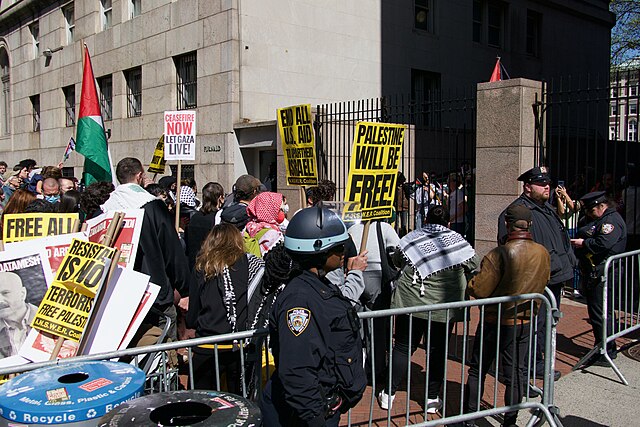A top U.S. intelligence official revealed that the Iranian government is providing financial support for the anti-Israel demonstrations that have roiled American college campuses and seen the use of antisemitic rhetoric.
A leading Iran expert and Trump-administration alumnus, Gabriel Noronha, told National Review that it’s a “welcome, if overdue” acknowledgement of Iran’s political-influence operations by the Biden administration, which has otherwise sought to accommodate Tehran.
The revelation came in an unusual press release today. Director of National Intelligence Avril Haines said: “We have observed actors ties to Iran’s government posing as activists online, seeking to encourage protests, and even providing financial support for protesters.” This, Haines wrote, came in the context of Iranian-regime actors “opportunistically” taking advantage of the protests. She also said that she issued her statement as “the first of what will be regular updates” about election-interference threats from foreign countries.
Iran’s leaders have openly cheered the anti-Israel student movement, which saw the formation of encampments on numerous college campuses, including Columbia University’s, this past spring. The protests involved the use of antisemitic language, including calls to “globalize the intifada.”
Iran’s brutal dictator, Ayatollah Ali Khamenei, said the demonstrators were part of “the right side of history” and went as far as to claim them as part of Iran’s ambitions for global Islamist revolution.
“You have now formed a branch of the Resistance Front and have begun an honorable struggle in the face of your government’s ruthless pressure — which openly supports Zionists,” Khamenei posted on X. Khamanei and other regime officials call the global network of terrorist groups they fund the “axis of resistance,” and the supreme leader’s post about the U.S. demonstrators suggests that he regards their efforts to be linked to operations by Hamas, Hezbollah, and other Iranian proxies.
Haines also said that Iran’s financing of the protests does not mean that all of their participants are linked to Tehran.
“I want to be clear that I know Americans who participate in protests are, in good faith, expressing their views on the conflict in Gaza — this intelligence does not indicate otherwise. Moreover, the freedom to express diverse views, when done peacefully, is essential to our democracy, but it is also important to warn of foreign actors who seek to exploit our debate for their own purposes,”
She added that Americans targeted by the operation might not know that they’re interacting with a foreign regime and that people should “remain vigilant as they engage online with accounts and actors they do not personally know.”
Haines’s statement is significant because it is the first time that the U.S. government has confirmed that Iran has had a direct hand in fueling the campus movement.
“Director Haines’ statement is a welcome if overdue turning point in the Biden administration, whose officials initially repeated and amplified Iranian state narratives but are now increasingly waking up to the many threats posed by the regime,” said Noronha, who worked on Iran policy at the State Department and is now a fellow at the Jewish Institute for National Security of America.
Noronha also pointed to long-running Iranian influence efforts that sought to shape Western public opinion and elite decision-making: “This has long been known and exposed by close Iran watchers, while simultaneously denied by those who welcomed the Iranian narratives.”
President Biden’s special envoy for Iran, Robert Malley, was connected to an Iranian influence network that was exposed by media reporting last year. He was reportedly suspended amid a State Department probe into his handling of classified materials, an investigation that has involved the FBI.
The intelligence community had previously warned about Iranian efforts to influence American elections in its annual threat assessment, pointing to operations in 2020 to steal voter info, promote election disinformation, and send “threatening emails.”
That report found: “The same Iranian actors have evolved their activities and developed a new set of techniques, combining cyber and influence capabilities, that Iran could deploy during the U.S. election cycle in 2024.”
Originally published by National Review.

